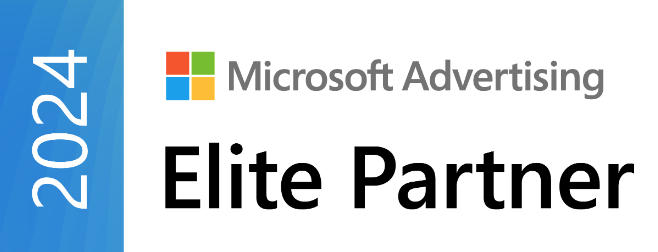SEO vs. PPC: Which Is Better for Your Business and Why

Running a business comes with making difficult decisions. When you’re deciding where to spend your digital marketing dollars, you’ll probably find yourself wondering which of the two is the better choice.
Is there a right or wrong answer? Is it possible to do both on a tight budget? To find the best solution for you, you need to understand the pros and cons of both SEO and PPC.
How to Choose the Right Digital Marketing Agency
Search Engine Optimization (SEO)
The Pros of SEO
1. SEO is highly profitable
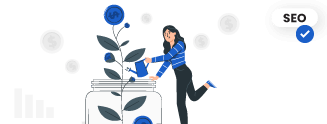
2. SEO is “always on”

3. SEO offers great ROI in the long run
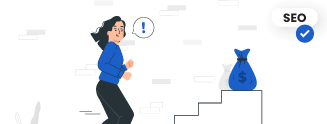
4. SEO occupies more space in SERPs
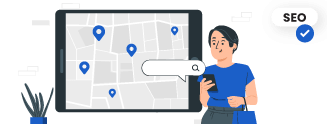
5. SEO showcases your creativity and expertise

For example, you can try some of these formats to get additional real estate in organic search results:
- Publish customer research articles
- Write long-form blogs about important topics relevant to your industry and line of work
- Make a video series showing off your service/product, your team, your company values, etc.
- Design eye-catching infographics
- Upload SlideShares
If you’re working with a good SEO company, they will incorporate all or most of the above content formats into your strategy, thus giving you an advantage over your competitors.
The Cons of SEO
1. SEO takes time to yield results
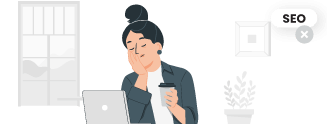
- The ROI you get from PPC is immediate, but it vanishes if you don’t keep investing.
- SEO takes time, but you’ll continue to get ROI long after the investment. Even with little maintenance, your returns can increase exponentially year after year.
How much time does it take to start seeing results? There’s no set time frame for that. It depends on your goals, your industry, your domain authority, and a number of other factors. Generally speaking, it will take at least six months before you start getting results.
2. Google algorithm changes

Error: Contact form not found.
</div><!-- [et_pb_line_break_holder] --><script><!-- [et_pb_line_break_holder] -->var wpcf7Elm = jQuery('#ebook3').closest('.wpcf7')[0];<!-- [et_pb_line_break_holder] -->wpcf7Elm.addEventListener( 'wpcf7mailsent',<!-- [et_pb_line_break_holder] -->function( event )<!-- [et_pb_line_break_holder] -->{ __ss_noform.push(['submit', null, '6ae6ba88-758e-4181-8889-06095a9d9cf9']); },<!-- [et_pb_line_break_holder] -->false );<!-- [et_pb_line_break_holder] --></script><!-- [et_pb_line_break_holder] --><script type="text/javascript"><!-- [et_pb_line_break_holder] --> var __ss_noform = __ss_noform || [];<!-- [et_pb_line_break_holder] --> __ss_noform.push(['baseURI', 'https://app-3QNJT3HPB0.marketingautomation.services/webforms/receivePostback/MzawMDE3NzQ3AgA/']);<!-- [et_pb_line_break_holder] --> __ss_noform.push(['form', 'ebook3', '6ae6ba88-758e-4181-8889-06095a9d9cf9']);<!-- [et_pb_line_break_holder] --> __ss_noform.push(['submitType', 'manual']);<!-- [et_pb_line_break_holder] --> </script><!-- [et_pb_line_break_holder] --><script type="text/javascript" src="https://koi-3QNJT3HPB0.marketingautomation.services/client/noform.js?ver=1.24" ></script>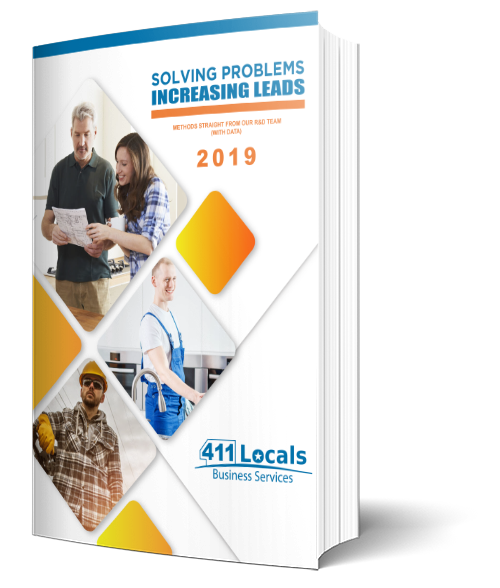
Pay-Per-Click Advertising (PPC)
The Pros of PPC
1. PPC brings near-immediate results

Although PPC can be costly in the long run, there are many reasons to consider its short-term benefits. If you want to promote a new product, run a sale or a special promotion, or gear up for the holiday season, PPC can give you that quick boost while SEO will be able to produce results months from now.
2. PPC lets you target specific audiences
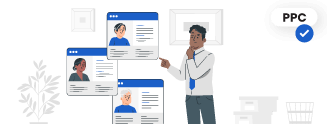
With PPC, you can easily show one ad in one location, and a different ad group in another location all at the same time. You can even run 50 different campaigns in 50 different locations, if that’s what will suit your business goals. PPC makes that possible.
3. PPC gets you straightforward data

PPC lets you easily track the progress of each of your campaigns and adjust your goals and metrics based on that data.
The Cons of PPC
1. No money, no results
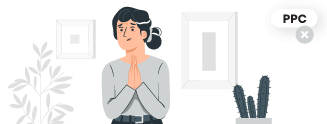
2. Higher cost per customer acquisition
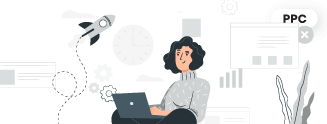
3. “Banner blindness”
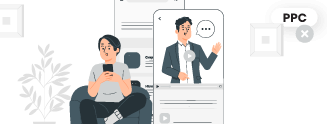
Which Is Better for Your Small Business: SEO or PPC?
But, having both in your digital marketing arsenal requires a certain amount of budget and time on your hands that you may not readily have. In that case, you’ll have to make a choice. These are your two options:
- Choose PPC if: you have the budget and your goal is to see an immediate boost in your sales.
Setting up an engaging PPC campaign with well-researched and targeted keywords will typically show you the fastest results. However, there’s a lot of trial and error in PPC, especially for the inexperienced enthusiast. If you have the budget, hire a PPC expert to mitigate the risk of overpaying for ads (and mistakes) with no ROI in return. - Choose SEO if: you don’t need to see immediate results and have a longer timeline in mind.
SEO takes time and can offer great results if you’re persistent and patient. In the long run, SEO can generate traffic and leads to your website without you having to pay for each visitor like you would with PPC.
However, if you’re serious about promoting your business and having a strong digital marketing strategy, you need to combine both SEO and PPC. Some internet advertising agencies offer flexible solutions that make it possible (and affordable enough) to incorporate both efforts into your digital marketing.
So, if you don’t feel like you should choose between SEO and PPC, find an agency or an expert that can offer both and boost your business. 411 Locals would gladly help you take your business to the next level. Give us a call if you’re interested in discussing our offers!
Error: Contact form not found.
